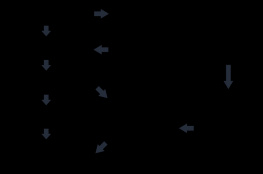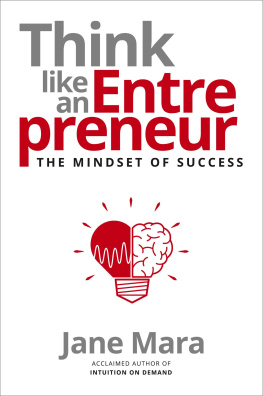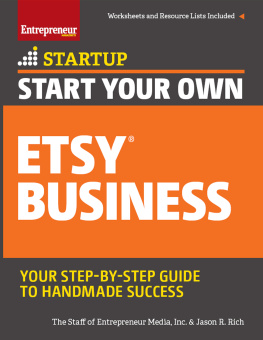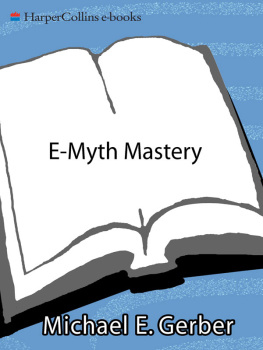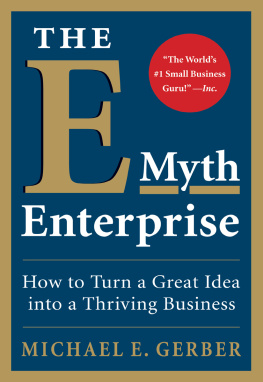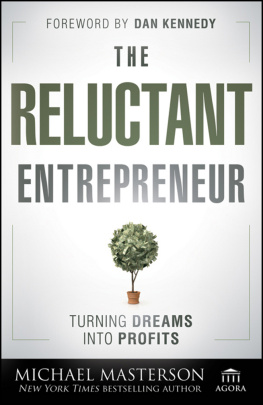Introduction
THE COLD SHOWER
Building my company was one of the most rewarding, challenging and humbling experiences of my life. I am proud to be part of that dysfunctional class of individuals called entrepreneurs who show the grit and strength of character to pursue their vision, and take on all challenges along the way. No one knows what it is like unless you have been there. There is no personal life and business life. It is your life. It is your soul. It is your oxygen. It is your spirit. Guilty as charged and proud of it.
But would I want to relive the experience of creating my first companyIncentOne? Not exactly. After all, sitting in the shower under freezing water for five minutes seemed easier than building IncentOne at times. Dont get me wrong, we did fine but we could have done better. You can too.
As for the shower:
I did it for the first time by mistake. The cold shower. No not that kind. I was religious about daily workouts when I was building my company. My workouts were always hyper-intense and often my escape. Its hard to worry about your technology vendor when you are sweating your ass off. I had just finished a workout and was taking a shower. I turned the water to only cold by mistake. It shocked me.
A thought crossed my mind. This is what it felt like running my company after the financial crisis of 2008. I tried something. I wanted to see how much I could take. If I could stand in the freezing water without flinching, then nothing that came across my desk would seem tough. From that day on, I did it every day and every day I added some time under the freezing water. By January 2009, I was standing under the water for five minutes. I promised myself I would do that every day until we got the company back on its feet. Try it sometime. Like the rest of us crazy entrepreneurs, when I got it up to five minutes, I thought can I spare that five minutes?
At the end of each shower, I would turn the water from cold to warm. Wow did that feel good. Welcome to the life of an entrepreneur.
Why do we do it? Being an entrepreneur can be a deeply rewarding experience. We revel in the triumph, big or small, that comes after hours of practice, years of struggle and devotion to a craft. If you have experienced the feeling of hitting a baseball cleanly, you know there is nothing like it. It feels as if you didnt even hit a ball. Your body feels drugged. Its the satisfaction that comes from fighting for your dream. Its the ballerina who spends countless hours on the pli, relev, and saut until her feet bleed and then nails her routine in a ballet performance in front of a packed house. Its the golfer who goes to the driving range, hits thousands of balls, and then bribes the owner to let him keep hitting balls until 2 a.m. He plays round after round and struggles with his game. Then comes the shot. The clean drive. The wedge to within ten feet.
The same is true for the entrepreneur. There are few feelings like building something from nothing. All the hard work seems worthwhile when our vision comes to life. Most of us will never forget our first logo, office and investment. Our first customer. The first day we made a profit. When we served that first piece of pizza. When someone wore our jewelry. The first press we gotit might have been a mention in the St. Lance Gazette with a circulation of 1,000, but it still felt great. Once we become the entrepreneur, there is a transformation that subsumes all that we do. It doesnt matter whether you are designing jewelry, building a new app, starting a catering business, opening a restaurant, or creating a healthcare company. You might be an innovator in the new sharing economy with a business on Uber, Etsy, Airbnb, or TaskRabbit. Whatever youre doingif youre an entrepreneurit is an obsession.
If youve never been an entrepreneur, heres what you might not understand: being an entrepreneur is not just a job. It is an identity. Entrepreneurism is like oxygen. Its not optional. Once you have an idea, you need it to breathe. Once you have that vision, its a drug that seethes through your blood every day. We say things to ourselves like, What was I doing with my life before I came across this? It may seem melodramatic, but not to those with a vision. There is nothing like it. And once youve experienced it, theres no going back.
Sounds pretty good, right? But entrepreneurship is not for the faint of heart. Youre heading into uncharted territory, probably without a map, or the right tools and enough supplies. There will be many days as an entrepreneur when you question what you are doing. Days when you dont know what you are doing. Days when you know what you are doing but are not sure why. Days when you are not proud of yourself. Days when success seems so near. And days when success seems out of reach. Life would be fine, or at least manageable, if you were simply making a business decision. But it is much more than that. As entrepreneurs, we take this stuff personally. We question our purpose, our character, our will, our motivations, our capabilities, and our ability to bring our visions to life. The happiest day can also be the loneliest one. This is the nature of the beast. Its a complex animal all of us entrepreneurs have to face.
My guess is that if youve picked up this book, you are experiencing at least one of the following feelings: Youre carrying the world on your shoulders. You dont have the money or resources you need. You feel like no one understands what you are going through. Your relationships are strained. Your friends, family and co-workers think you are crazy, stupid or selfish. You find yourself in a crowded room but feel alone. You are exhausted but you cant sleep. You are hungry but you cant eat. You are home but feel lost. Standing in the shower under freezing cold water for five minutes seems easier than running your venture. Sound familiar? Ive been there. Its one thing to create solutions to business problems. Its quite another to create them when you feel the world is on your shoulders. When that happens, we feel like we are sprinting through cement even when we have talent and great business ideas.
All of the conflicting feelings that come with the territory are at the heart of the big question facing all of us: will we make it? How we cope with the struggle has as much, if not more, impact on our fate as the business decisions we make. Though I didnt know it at the time, The Lonely Entrepreneur was born in the middle of my own struggleactuallyin the middle a struggle that can only be described as the perfect storm.
After a decade of blood, sweat and tears, we closed our first big outside investment on October 15, 2008nearly ten years to the day from when we opened the doors. We should have been celebrating our recent successes and a big new investment. The financial crisis of 2008 was already brewing and hit us like an enormous, crushing wave. Among other catastrophes, it bankrupted our biggest clients and severed relationships that had taken years to build. Our business? A decade of work virtually gone in ten days. We were on the brink of disaster. I didnt know if the business was going to survive, but for it to have a chance, I knew it would take two years of twenty-hour days to dig ourselves out. Imagine thattwo years to save what it took ten years to buildand there was no guarantee wed make it.
Weathering the storm, as youll see, was a serious fightone I almost lost. The stakes were high: I wasnt just fighting to save the business. I was fighting to save my employees, my clients, my investors, my family, my deteriorating relationship with my brother, and myselfthough I would have gladly sacrificed myself if it would have saved everyone else.
I needed solutions immediately, desperately. Yet in the eye of this perfect storm, I realized quickly that the normal solutions were not going to work. It was no longer a decision to take this road or that roadthere werent any roads left. The roads and bridges had been annihilated by the financial crisis. All familiar routes were gone. There was no shortage of toolsbusiness plans, financing strategies, advisors and the like. But in the eye of this storm, these familiar strategies failed. The solution was not another business plan or spreadsheet. What I needed most was not a tool but rather something more fundamental.
Next page


